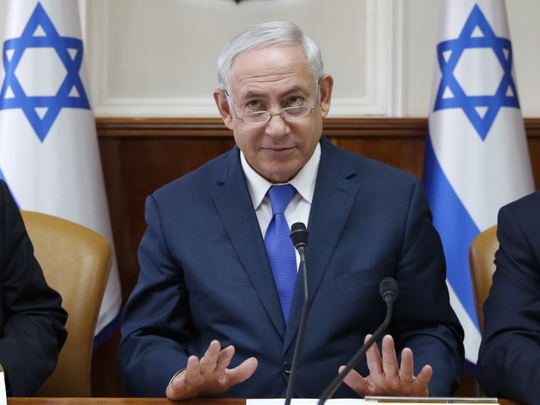
He doesn’t have to go about it in a stealthy manner anymore, advancing all sorts of tortuous excuses as to why he feels the need to do what he’s about to do. Now he does it openly, challenging the international community to confront him, if it has the means and the gall to do so.
Last week, Israel’s Prime Minister Benjamin Netanyahu, without much ado, approved building plans for close to 4,000 new housing units in the Jewish colonies established in the occupied West Bank, an expansion clearly induced by the feeling that the administration of United States President Donald Trump’s muted stance on colony-building (“not a good thing for peace”) is more accommodating than former US president Barack Obama’s (“[it] is illegitimate”). Plans for the expansion will include the heart of Hebron, a place where Israel has held off on expanding its isolated colony there for years.
Couple that with the fact that America’s Ambassador to Israel, David Friedman, is known to act, as Palestinian officials in the West Bank have said, more like a right-wing Israeli cabinet minister than an American diplomat. It’s well-known that he has called Israel’s occupation “the alleged occupation”. And, besides, why the fuss? After all, “only 2 per cent of the West Bank is occupied”, he said. For such indiscretions, another US administration would have recalled him immediately.
Israel’s colonial project in Palestine since 1967 is one of the most egregious crimes ever committed against defenceless people in modern times, anywhere in the world. Today, 600,000 Israeli colonists live there, including 200,000 in occupied Jerusalem. The colonies they live in were approved, over the last 50 years, by every Israeli government, whether left-wing or right-wing, liberal or conservative, hard-line or moderate, which further prove — if any further proof is needed at all — that land-grabbing is at the core of Zionism, an ideology imbued with racism and racial discrimination. Consider this: The international community, guided by international law, is in full agreement that Israel’s colonisation project is unlawful, and has opposed it in countless forums. The US, for its part, is on record as opposing it. And the United Nations, via various resolutions — the most recent being the one issued by the UN Security Council last year with a 14-0 vote — has made it abundantly clear that Israel is breaking the law.
Yet, Israel, with much gall, thumbs its nose at the world and issues a threat to the American president.
But, folks, Israel’s colonisation project in the Occupied Territories is not just a clear and present danger to a future Palestinian state, but a disaster for ordinary Palestinians everywhere, since land robbery has unintended consequences that extend beyond the mere act of confiscation.
To start with, as a case in point, Israeli colonisation in the West Bank severely restricts access by Palestinians to their water resources. This destroys or limits the productivity of the agricultural sector, which in turn leads to systematic destruction, across the board, of the economic and social fabric of Palestinian life. The US has done little over the years to impede, let alone block this downward spiral.
Then consider what is known in the western media as “[colonist] violence”, often of the gratuitous and vigilante kind, where colonists, like packs of wolves, partake in organised raids that include the burning of orchards, vandalism, firebombing, robbing farmers of their olive harvests, marches marked by chants of “death to Arabs” ... — all reminiscent of the Brownshirts in Nazi Germany and the Ku Klux Klan in America’s once-segregated South.
While the US State Department has, over the years, repeated the toothless refrain that “[Colonies] are not helpful to the peace process”, it has done nothing to follow up on it. A sizeable number of Americans (37 per cent) think that their country should respond to Israel’s ongoing colonisation enterprise with “economic sanctions”.
As far back as 1979, the then US president, Jimmy Carter, had declared earnestly: “We consider these [colonies] to be contrary to the Geneva Convention, that Occupied Territories should not be changed by establishment of permanent [colonies] by the occupying power.” Thirty years later, in 2009, former US president Barack Obama declared equally earnestly: “America does not accept the legitimacy of continued Israeli [colonies].” In between, other US presidents had expressed similar sentiments.
The response of Palestinians to all this? Talk is cheap.
Fawaz Turki is a journalist, lecturer and author based in Washington. He is the author of The Disinherited: Journal of a Palestinian Exile.












